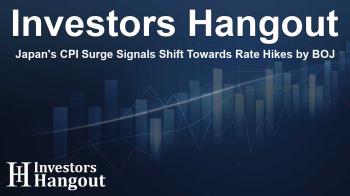Japan's CPI Surge Signals Shift Towards Rate Hikes by BOJ

Japan's Consumer Price Index Demonstrates Significant Growth
In December, Japan's consumer price index (CPI) inflation increased as anticipated, remaining significantly above the Bank of Japan’s (BOJ) targeted range. This development paves the way for a potential interest rate hike by the central bank.
Core CPI Indicates Sustained Inflation Pressure
Data revealed that the national core CPI, which excludes volatile fresh food prices, grew by 3% year-on-year in December. This figure was anticipated and marks the highest level since mid-2023, a rise from the 2.7% recorded in the previous month.
Steady Core Reading Excluding Food and Energy
Moreover, a core reading that excludes both fresh food and energy prices remained constant at 2.4% in December. This reading is critical for the BOJ as it reflects underlying inflation trends and has been above the bank's 2% annual target for four consecutive months.
Headline CPI Reaches Two-Year High
The headline CPI reached a two-year peak of 3.6% year-on-year in December, climbing from 2.9% the month prior. This increase in inflation is noteworthy as it coincides with the conclusion of a BOJ meeting where a rate hike is widely anticipated.
Job Market and Wage Growth Fueling Inflation
The recent increase in CPI inflation is attributed largely to strong private consumption, propelled by significant wage increases throughout the past year. These higher wages have played a vital role in driving up demand and consequently inflation.
Market Dynamics and Currency Impact
The weaker yen has also contributed to rising inflation, influenced by a mix of low domestic interest rates and expectations of prolonged high interest rates in the U.S. The bank's decision to raise interest rates signals confidence in the strength of the economy and stability of consumer spending.
Implications of Wage Negotiations Ahead
As spring approaches, anticipated wage negotiations between labor unions and major corporations are likely to yield further substantial wage hikes in 2025. This scenario provides the BOJ with additional motivation to adjust interest rates upward.
The Shift in BOJ's Policy Approach
The central bank marked a pivotal moment last year by shifting away from its nearly decade-long ultra-loose policy, implementing rate hikes for the first time since 2008. This transition indicates a changing landscape for Japanese monetary policy as external economic factors influence domestic decision-making.
Frequently Asked Questions
What does the increase in Japan's CPI indicate?
The rise in Japan’s CPI suggests sustained inflation pressure, which may lead to interest rate hikes by the Bank of Japan.
Why is the core CPI important?
Core CPI is vital as it serves as a key indicator for the underlying inflation trend, excluding the volatility from fresh food and energy prices.
How might wage negotiations impact inflation?
Wage negotiations are expected to result in higher wages, potentially fueling further inflation and giving the BOJ more reasons to increase interest rates.
What external factors are influencing Japan's economy?
The depreciation of the yen, low domestic interest rates, and international interest rate expectations are significant external factors impacting Japan's economy.
When was the last time the BOJ raised interest rates?
The BOJ raised interest rates last year for the first time since 2008, marking a substantial policy shift after years of ultra-loose monetary conditions.
About Investors Hangout
Investors Hangout is a leading online stock forum for financial discussion and learning, offering a wide range of free tools and resources. It draws in traders of all levels, who exchange market knowledge, investigate trading tactics, and keep an eye on industry developments in real time. Featuring financial articles, stock message boards, quotes, charts, company profiles, and live news updates. Through cooperative learning and a wealth of informational resources, it helps users from novices creating their first portfolios to experts honing their techniques. Join Investors Hangout today: https://investorshangout.com/
Disclaimer: The content of this article is solely for general informational purposes only; it does not represent legal, financial, or investment advice. Investors Hangout does not offer financial advice; the author is not a licensed financial advisor. Consult a qualified advisor before making any financial or investment decisions based on this article. The author's interpretation of publicly available data presented here; as a result, they should not be taken as advice to purchase, sell, or hold any securities mentioned or any other investments. If any of the material offered here is inaccurate, please contact us for corrections.
